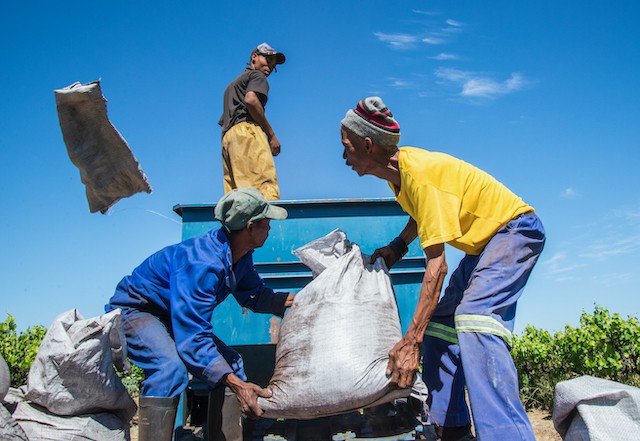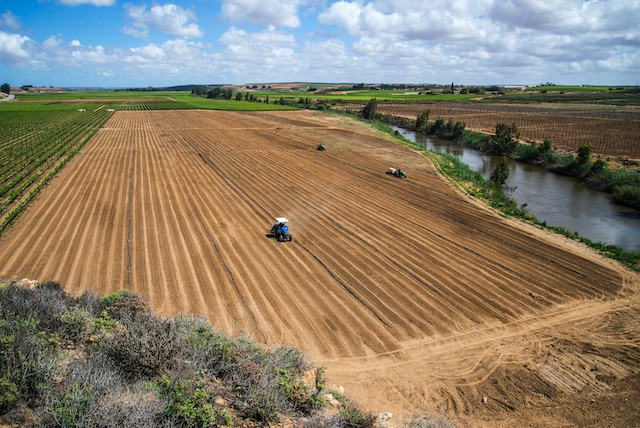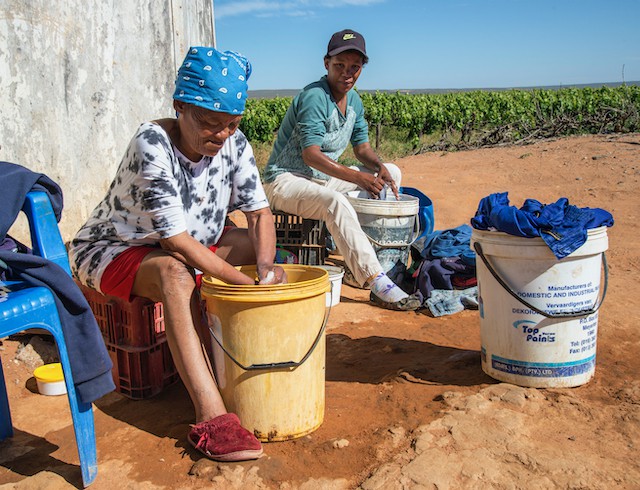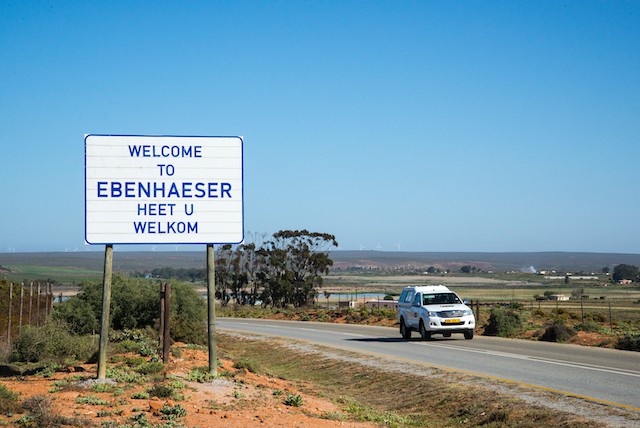Almost a century later, land claimants get back thousands of hectares of farm land and vineyards
Ebenhaeser community’s claim finally settled in mediated negotiations during lockdown
Jan Swartz, left, and Jan Burk lift a bag of compost into a spreading machine while Gert Burk, in the background, throws down an empty bag. Photos: John Yeld
Residents of historic little Ebenhaeser on the west coast spent close to a century tilling inferior soil after they were forced off their productive ancestral land in 1926 by South Africa’s segregationist policies.
The 2,000-strong community in the lower Olifants River valley will have extra reason to celebrate the coming grape harvest in March and April, when the harvest home ritual will mark the successful conclusion of a land restitution claim they submitted soon after the advent of democracy.
The Ebenhaeser community’s total claim is for some 23,700ha, valued in 2015 at R363 million, for both land and developmental support from the government.
Submitted in 1996, it was one of the biggest land restitution applications in the Western Cape. It was also one of the longest unresolved claims, until a highly complex settlement agreement was finally secured during mediation sessions held in the Covid-19 lockdown period in May and June.
During this mediation, the last stumbling block was removed: the community’s claim to a set of vineyards and other agricultural properties totalling 677.4ha and valued at R168.4 million, which was strongly opposed by the landowners.
Retired Judge Eberhard Bertelsmann, who had served in the Land Claims Court among other judicial appointments, served as mediator.
Averting what would have been a lengthy and very costly trial, all the parties finally signed a formal Settlement Agreement that was made an Order of Court on 28 August 2020 in the Land Claims Court in Cape Town.
This agreement confirmed the restitution of most of the land lost by the Ebenhaeser community in 1926 and included substantial government funding to help the community manage the restored farms and – hopefully – avoid problems that have dogged other major land claims, like Elandskloof in the Cederberg.
Land preparation in the highly productive Lutzville valley wine district in the lower Olifants River valley.
Ebenhaeser (the name has several variant spellings, including the original Ebenezer), is a small community some 40km from Vredendal. Its origins lie in the use of this land by a clan of indigenous Khoekhoen inhabitants, then under the leadership of Kaptein Kees Louis who invited the Rhenish Missionary Society (RMS) in 1831 to establish a mission station in the area. It was from this customary and mission land that descendants were forced to move in 1926. [See below]
“When the land claim was first submitted, I was still in primary school,” current Ebenhaeser Communal Property Association (ECPA) chairperson Madelein van Niekerk says with a laugh.
Land reform and rural development specialist David Mayson, who first became involved while working for the Surplus People Project in 1998 and then later from 2012 as lead consultant for the Department of Land Affairs and Commission for the Restitution of Land Rights, says negotiations were a drawn-out “stop-start, stop-start” affair.
The ECPA was one of three organisations established during negotiations. The second was the Ebenhaeser Development Trust and the third was Ebenhaeser Agri (Pty) Ltd. Bringing these critical organisations into existence took years. The ECPA, established in 2014, as the formal representative of all 1,720 land claimants to hold all the title deeds to the land (deaths had reduced the number of claimants from the original 1,840); the trust, established in 2015, with broader responsibility as the operational arm of the community’s affairs and to address its developmental needs; and the company, established just this year, to undertake the community’s commercial farming operations.
In October 2013, the claimants also accepted a Community Development and Land Acquisition Plan drawn up for them that laid out in detail their future negotiating position on how the claim should be settled and the methodology for valuing the many various elements of their claim, among other aspects.
The formation of the ECPA and the trust, and acceptance of the development and acquisition plan, facilitated the next major step in the restitution process – the signing on13 June 2015 of the Ebenhaeser Land Claim Settlement Agreement between the Ebenhaeser Community, the ECPA, then Minister of Rural Development and Land Reform Gugile Nkwinti, and the Commission on Restitution of Land Rights, when the value of the entire claim was accepted as just under R363 million.
The land included 1,560 hectares of highly productive irrigated agricultural land in the lower Olifants River valley, mostly under vines, owned by 44 white landowners as well as other state land.
Although all 44 landowners had originally contested the Ebenhaeser land claim, under the 2015 agreement half of them withdrew their objections and agreed to sell to the government land totalling 665ha.
However, these were mostly very small and/or agriculturally marginal properties, and acquisition of these and other properties claimed was extremely slow. By 2020, just 13 properties had been bought by the government for the community.
Crucially, in terms of the final 2020 Settlement Agreement, the 22 unwilling sellers – called “landowner defendants” in the legal documents – have now also agreed to sell their land to the community. Some of their properties will be transferred unconditionally to the Ebenhaeser community next year after the harvest, and their remaining properties will be subject to individual rental leases allowing them to continue farming there for between eight and 13 years – or even longer by agreement.
The Ebenhaeser community has also been awarded large parcels of state-owned land: 3,160ha outside the irrigated farming area; two portions of land totalling 739ha near the little fishing village of Papendorp lower down the Olifants River near the estuary; and 18,288ha comprising the “new Ebenezer” area to which the community had been moved in 1926 under a government “tenure reform” programme.
As part of its commitment to settling the claim, the government has already paid close to R51 million to the trust account of the community’s attorneys as “development support funding” to fund the implementation of the final agreement and the community’s future farming, development and skills training needs.
It will also pay a further R9 million as cash compensation to individual members as a result of benefits lost because of the slow processing of the land claim since 2015, and R24 million as financial compensation to descendants of the Ebenhaeser community who are not members of the ECPA and who live outside the village.
It has undertaken to push for the legal transfer of all the properties involved by 1st April 2021 at the latest – by which date the grape harvest should be complete, or close to completion.
As part of the earlier 2015 partial settlement agreement, each member of the ECPA older than 60 on the day of that signing received an “elderly payment” of R7,500, to a total value of R2 million, in lieu of some of the claimed land that was not acquired.
Mayson describes the final 2020 Settlement Agreement as novel and creative for its wide ambit. “It was an incredible experience to be part of those final negotiations,” he says.
Mietjie Philippus, left, and Sandra Swart are among the 1,720 members of the Ebenhaeser community benefiting from the successful land claim.
The Ebenhaeser community is under no illusions about how much hard work lies ahead to make the land restitution successful.
Van Niekerk, who was elected ECPA chairperson in 2018, says the negotiations had made her “verskriklik moeg” (extremely tired). “For us this [settlement] is a good thing and there are many plans. We have many dreams for the community.
“But we also have to understand that there are implementation plans to help us with the farming that we have to follow, and the state wasn’t timeous with its RECAP [Recapitalisation and Development Programme].
“We’re not yet where we want to be but we’re at the crossroads, and we’re busy standing up for ourselves.”
Mark Mannel, a trustee of the Ebenhaeser Trust and a director of Ebenhaeser Agri (Pty) Ltd, recalls vividly the trust’s difficulties after the first seven farms under their claim were transferred to the community.
“We started in 2015 with zero [RECAP assistance], but we still managed to deliver a harvest to the cellars without any funding. We had just two old tractors and we struggled a lot. But that motivated us, I think, and we learned many lessons from that hardship. We had to learn the lessons of farming.”
Since 2017, he and his farming team have been on an upward trajectory, he says. “Our yield is up, we’re up to where we should be, and we’re doing everything that we can. There are 1,720 beneficiaries – this means that these farms must be managed optimally so that we can return benefits to the community.”
Among several partnerships that the trust has developed, or is in the process of developing, Mannel is particularly proud of the relationship with Vredendal-based Stellar Wines, South Africa’s largest producer of organic, fair trade wines. A 20-year management agreement includes a contract for buying Ebenhaeser’s entire vineyard production at competitive rates.
During the coming fortnight, the trust will plant 16ha of new, high quality sauvignon blanc vines, Mannel says.
“We’re tremendously positive, we know we’re on the right road, and we have bigger things in mind. And we want to bring the small Ebenhaeser farmers [holders of individual 2ha plots] with us. We don’t have any choice – we must educate our people so we get to the level where they are stand-alone farmers.
“The transfer of skills is important, but it’s not going to happen overnight.”
During a ceremony in March last year to hand over title deeds for other properties secured under the community’s claim, President Cyril Ramaphosa spoke of the brutality of apartheid laws and land dispossession that had been keenly felt in the farmlands of the Western Cape.
“The story of farmworkers and labour tenants in the Western Cape, like the story of farmworkers elsewhere, has until now been told through a vale of tears. It’s a story of rootlessness, of dispossession … a story of one of the greatest injustices,” he said.
Now, the August 2020 Ebenhaeser agreement has excised some of that injustice, reversing the wrongs of a century of unfairness and providing balm for some very deep communal pain.
In the August 2020 Final Settlement agreement of the Ebenhaeser land claim, the 22 “defendant landowners” concede that the Ebenhaeser community were dispossessed of their lands rights as a result of “racially discriminatory laws or practices”. The legal representative of the 22 “land defendants” was invited to comment on the settlement but had not responded to GroundUp at the time of publication.
Major points of the consolidated agreement include:
- The Ebenhaeser Communal Property Association (ECPA) will be entitled to take occupation of agricultural portions of those properties acquired “unconditionally” from the sellers, with all water rights, on 1st April 2021, and of houses, outbuildings, store rooms, sheds and other structures no later than 31st July 2021;
- On this “unconditional” land, the sellers will be entitled to harvest grapes and other crops up to and including 1st April 2021;
- “Conditional land” will be subject to phased transfer or hand-over lease agreements between the ECPA and the individual sellers (defendant landowners), who will retain occupation and use of these properties for stipulated periods;
- Such “conditional” use rights will be for an initial period of eight years, starting on 1st April 2021, with an option to renew for a further five years;
- By agreement, there will be no “solatium” payments (a form of compensation for emotional rather than physical or financial harm) or relocation payments to the sellers;
- Inspections are to be conducted by a representative of Vinpro (the non-profit company representing 3 500 South African wine producers, cellars and wine industry stakeholders), “duly qualified” representatives of the department, and an official from the minister’s office, to satisfy themselves that on transfer properties are in the same condition as they were on the date of valuation, “fair wear and tear excepted”;
- After transfer, an initial rental of R5,500 per hectare per year (excluding VAT) will be payable monthly in advance to the ECPA in respect of presently cultivated land;
- A replanting regime for vines on “conditional” land will be determined by Vinpro, and will average at least 5% annually for the duration of the agreement;
- Vinpro’s representative at Vredendal will inspect the vineyards on the conditional farms annually for the duration of the lease agreements in order to ensure that the approved replanting plan has been complied with;
- If any of the landowner defendants decide to sell on the open market any of their properties not affected by this land claim, they will first give the ECPA 14 days’ notice to allow it to make a written offer to purchase.
The entrance to the village of Ebenhaeser in the lower Olifants River valley
What’s in a name?
Support independent journalism
Donate using Payfast

Next: “Some learners don’t get proper meals at home and come to school hungry”
Previous: Lottery boss paid almost R2 million to stay at home
© 2020 GroundUp. This article is licensed under a Creative Commons Attribution-NoDerivatives 4.0 International License.
You may republish this article, so long as you credit the authors and GroundUp, and do not change the text. Please include a link back to the original article.




